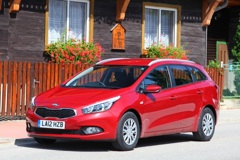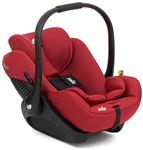Volkswagen Golf Estate (2009 – 2013) Review
Volkswagen Golf Estate (2009 – 2013) At A Glance
If you're looking for the newer version, you need our Volkswagen Golf Estate review.
This Volkswagen Golf estate isn't quite as new as it looks. It may have the headlights and grille of the 2009 MK VI Golf hatchback, but it's essentially the same car that was on sale from 2007-2009. Volkswagen has done something similar with the Golf Plus and both cars are based on the Golf MK V, rather than the newer MK VI.
Plus points are the addition of cleaner petrol and diesel engines. While there's not the wide selection of engines that you get with the Golf hatchback, you can pick from some of Volkswagen's finest engines. Of particular note is the Bluemotion model. This uses an ultra-clean 1.6-litre TDI diesel engine to achieve 67mpg and emissions of 109g/km.
Open the tailgate and there's a large, useful boot. There's an impressive 505 litres on offer with the seats up and 1495 litres with the seats folded - more than enough for the needs of most families.
Improvements over the previous Golf Estate include an upgraded dashboard, improved refinement and better standard and optional equipment, including a parking system that will park the car for you. Overall, the Golf estate makes a practical and fuss-free family car.
Real MPG average for a Volkswagen Golf Estate (2009 – 2013)

Real MPG was created following thousands of readers telling us that their cars could not match the official figures.
Real MPG gives real world data from drivers like you to show how much fuel a vehicle really uses.
Average performance
84%
Real MPG
34–68 mpg
MPGs submitted
204
Diesel or petrol? If you're unsure whether to go for a petrol or diesel (or even an electric model if it's available), then you need our Petrol or Diesel? calculator. It does the maths on petrols, diesels and electric cars to show which is best suited to you.
Satisfaction Index
 What is your car like to live with?
What is your car like to live with?
We need your help with our latest Satisfaction Index, so that we can help others make a smarter car buying decision. What's it like to live with your car? Love it? Loath it? We want to know. Let us know about your car - it will only take a few minutes and you could be helping thousands of others.
Help us with the Honest John Satisfaction Index now
.jpg?width=640&height=426&rmode=crop)
.jpg?width=640&height=426&rmode=crop)
.jpg?width=640&height=426&rmode=crop)
.jpg?width=640&height=426&rmode=crop)
.jpg?width=640&height=426&rmode=crop)
.jpg?width=640&height=426&rmode=crop)
.jpg?width=640&height=426&rmode=crop)


 Bluemotion Technology model has impressively low emissions and high mpg, upgraded interior is an improvement on the previous model.
Bluemotion Technology model has impressively low emissions and high mpg, upgraded interior is an improvement on the previous model.
 Not a MK VI Golf underneath despite the looks, legroom is tight in the back.
Not a MK VI Golf underneath despite the looks, legroom is tight in the back.
.jpg?width=240&height=160&rmode=crop)

.jpg?width=240&height=160&rmode=crop)





